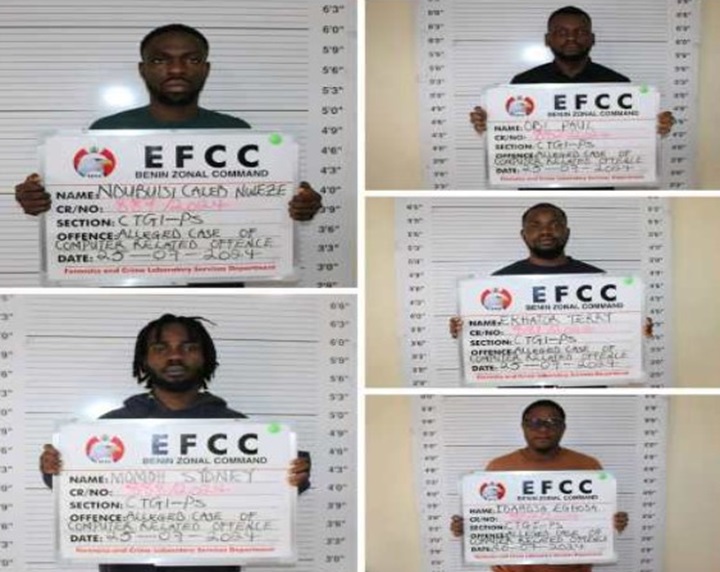In a significant legal victory against cybercrime, the Edo State High Court in Benin City has convicted and sentenced five internet fraudsters to various prison terms.
The convicts – Terry Ekhator, Sydney Momoh, Paul Obi, Celab Ndubuisi, and Idahosa Eghosa—were brought to justice by the Benin Zonal Directorate of the Economic and Financial Crimes Commission (EFCC).
The convicted individuals were charged with offences related to obtaining false pretence and possession of fraudulent documents. The charges stemmed from their involvement in computer-related fraud, a growing concern that has attracted increased scrutiny from Nigerian authorities.
One of the charges, specifically against Terry Ekhator, exemplifies the nature of their crimes. The charge read: “That you, Terry Ekhator (m), on or about the 22nd of July, 2024, within the jurisdiction of this Honourable Court, did have in your possession documents which you knew or ought to have known contained false pretence, thereby committing an offence contrary to Sections 6 and 8 of the Advance Fee Fraud and Other Fraud Related Offences Act 2006 and punishable under Section 1(3) of the same Act.”

These charges highlight the seriousness with which the Nigerian legal system treats such fraudulent activities. All five defendants, upon hearing the charges, pleaded guilty. Their guilty pleas allowed the prosecution, led by counsels K.Y. Bello and A. A. Al-Amin, to swiftly move for their conviction and sentencing.
The defence counsel, in a bid to secure leniency, pleaded with the court to temper justice with mercy. They argued that the defendants had shown remorse for their actions and were willing to reform.
Justice Igho Braimoh, who presided over the cases of Ekhator, Momoh, Obi, and Ndubuisi, delivered judgements that reflected the gravity of their crimes while also considering the defendants’ pleas for leniency:
- Terry Ekhator and Sydney Momoh: Both were sentenced to two years imprisonment each, with the option to pay a fine of ₦200,000 (Two Hundred Thousand Naira) instead of serving their prison terms.
- Paul Obi: Received a three-year prison sentence, also with the option of a ₦200,000 fine.
On the following day, Justice Braimoh continued with the sentencing:
- Celab Ndubuisi: Was handed a three-year sentence, with the same fine option of ₦200,000.
Meanwhile, on July 31, Justice G. O. Imadegbelo sentenced the last of the convicts:
- Idahosa Eghosa: Received a three-year prison term, again with the alternative of paying a ₦200,000 fine.
These sentences underscore the judiciary’s balanced approach—upholding the law while providing avenues for restitution. The financial penalties offer the convicts a chance to atone for their crimes without overcrowding the prison system.
Asset Forfeiture and Undertakings
Beyond the prison terms and fines, the convicts were also ordered to forfeit all assets connected to their criminal activities. This includes mobile phones, laptops, and the balances in their various bank accounts. These items, deemed instruments and proceeds of crime, were confiscated by the Federal Government of Nigeria, ensuring that the convicts did not profit from their illegal activities.
In addition, the convicts were mandated to provide written undertakings, pledging to maintain good behaviour following their release. This requirement is a crucial step in their rehabilitation, aiming to prevent recidivism and promote responsible conduct in the future.
The successful conviction of these five individuals is a testament to the diligent efforts of the EFCC’s Benin Zonal Directorate. Their journey to the correctional centre began with their arrest by EFCC operatives, who had been monitoring their involvement in internet-related fraud. The EFCC, through its strategic operations and collaboration with other law enforcement agencies, continues to make significant strides in combating cybercrime in Nigeria.
These convictions send a clear message to would-be fraudsters: the Nigerian government, through the EFCC and the judiciary, is committed to eradicating cybercrime. The legal framework in place, including the Advance Fee Fraud and Other Fraud Related Offences Act, provides robust mechanisms for prosecuting offenders and recovering illicit gains.
As Nigeria grapples with the rise of internet fraud, these convictions serve as a critical deterrent. They reinforce the notion that cybercriminals, no matter how sophisticated, will face the full weight of the law. The Edo State High Court’s rulings are part of a broader national effort to clean up Nigeria’s cyberspace and restore its reputation on the global stage.
By holding these fraudsters accountable, the courts have not only delivered justice but also contributed to the ongoing battle against cybercrime. The EFCC, empowered by such legal victories, is poised to continue its relentless pursuit of internet fraudsters, ensuring that those who exploit technology for illicit gain are brought to book.
The conviction of these five internet fraudsters in Benin City marks a significant milestone in Nigeria’s fight against cybercrime. Through the efforts of the EFCC and the judiciary, justice has been served, and a clear precedent has been set. As Nigeria continues to strengthen its legal and institutional frameworks, the hope is that such cases will become increasingly rare, paving the way for a safer and more secure digital environment.
Support InfoStride News' Credible Journalism: Only credible journalism can guarantee a fair, accountable and transparent society, including democracy and government. It involves a lot of efforts and money. We need your support. Click here to Donate
